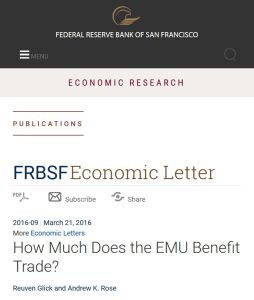Join getAbstract to access the summary!

Join getAbstract to access the summary!
Reuven Glick and Andrew K. Rose
How Much Does the EMU Benefit Trade?
FRBSF, 2016
What's inside?
When countries unite around a common currency, do they really enjoy significant increases in trade?
Recommendation
Europe’s Economic and Monetary Union has conferred trade advantages on its participants in the form of reduced trade costs and the removal of exchange rate risk. Not everyone agrees, however, that those benefits are worth the cost. In a comprehensive study spanning 200 countries and 65 years of trade data, economists Reuven Glick and Andrew K. Rose examine the impact of various currency alliances on trade. getAbstract recommends this scholarly report to economists and anyone looking for a briefing on the value of a monetary union.
Summary
About the Authors
Reuven Glick is a group vice president at the Federal Reserve Bank of San Francisco. Andrew K. Rose is a professor at Haas School of Business, University of California, Berkeley.

















Comment on this summary